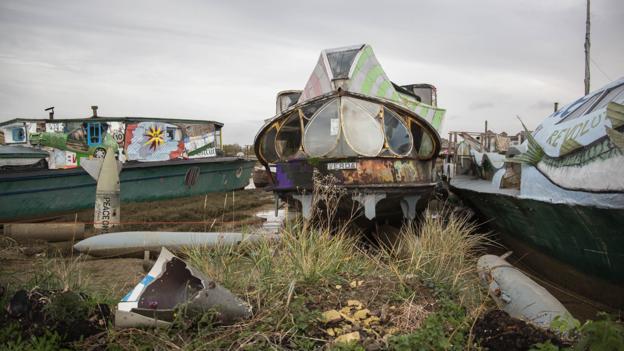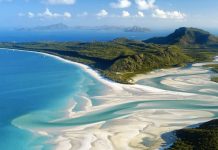This post may contain affiliate links. We may earn money or products from the highlighted keywords or companies or banners mentioned in this post.

It's been called the “wackiest street in Britain”, much to the annoyance of residents. Set on the estuary of the River Adur in the coastal Sussex town of Shoreham-on-Sea, the little towpath – simply named Riverbank – is home to more than 40 distinctive houseboats that are rather a soulful celebration of creativity and free spiritedness.
On Riverbank, homes move with the tides that raise and lower the boats from their muddy cradle every day. The boats’ residents share their world with fishermen, yachties, workers from the nearby port and the rich bird life of a tiny RSPB reserve. On the estuary's inland side to the north, meanwhile, Shoreham's increasingly cosmopolitan old town offers hip cafes and boutiques and weekend street markets in the lee of the ancient, flint-stoned church of St Nicolas, whose foundations date back to Saxon times around AD900.
A graceful white footbridge links the old town to Riverbank and the enclave of Shoreham Beach, where seafront houses butt against a vast expanse of shingle beach backed by beach huts and a lagoon. Prop planes occasionally buzz in to land by the beautiful 1930s Art Deco terminal of Shoreham Airport – sometimes known as Brighton City Airport – which, founded in 1910, is not only the UK's oldest airport but the oldest purpose-built commercial airport in the world.
The soft green slopes of the South Downs – the term “downs” comes from the Saxon word “dun” for hill – rise behind the town, topped by the Gothic wonder of Lancing College. This amazing building was used for scenes in the 2008 film version of Brideshead Revisited by Evelyn Waugh, an old boy of the school.
The boat-lined towpath that is Riverbank may be less grand but it is no less memorable as you walk along its narrow thread, flanked by stands of wild fennel and artichoke, piles of wood-burner logs and rusting marine detritus.
Every boat along the bay is different; engaging clutter spreads out from their gangplanks, from letterboxes made from old microwaves to ingenious tiny “gardens”. A giant wind chime that draws admirers to number 27 – Silvia Emery's Moidore – is fashioned from an old metal piano frame and strings of seashells.
Though the first boats were moored here in the 1920s, much of today's fleet were brought here in the late 1950s and early 1960s. Many are decommissioned military craft, such as Valeur – a former D-Day British landing craft, whose owner Adrian tells me is one of only a handful still in existence. It sits beside the sleek grey bulk of the post-war German torpedo boat Fische, now transformed into a four-bedroom home. Lunasea served as a British gunboat at the D-Day landings.
The community has a rich history of its own, dating back nearly a century to the 1920s, as chronicled by the community's fascinating Facebook page. It expanded greatly as a novel answer to Britain’s accommodation shortage in the years after World War Two, then again later as a haven for folk seeking more alternative lifestyles during the hippy era of the 1960s.
One core group of past residents met at the Royal College of Art in the early 1960s, explained Ian Meriwoode – resident at number 31 (Raglan) – who has become the unofficial historian of the Shoreham boat community. “Rod Stewart mentions the community in his autobiography from the early 1960s, when he tried to stay – but wasn't cool enough for the hardcore beatniks!” he added.
In the last couple of years, two of the vessels have also become B&Bs, a unique alternative to staying in Brighton, which lies just a few miles east. The Shieldsman is a former Tyneside passenger ferry, while Dodge is a quirky amalgam of an old hull with a carapace featuring an old lifeboat joined to a vintage fire engine.
Dodge is the brainchild of Hamish McKenzie, whose expanding mini-flotilla of boats (he now has seven) seem as much works of art as places to live.
Verda – built from what was once a Portsmouth-Gosport ferry – is perhaps the most glorious example of a floating sculpture. Its exterior is topped by crinkly striped metal roofing and giant bug-eye windows, plus an old 60-seater coach that has been sawed in half and built onto the decks of an old coal-carrying vessel. A Reliant Robin – the strange but iconic British three-wheeler car famously driven by shady trader Del Boy in the hit BBC TV series Only Fools And Horses – pokes out of one side of another of McKenzie's boats.
Verda’s interior is equally memorable. As we chatted over a cuppa, I noticed a mummified cat, strangely adorned mannequins and chairs made from boat bits. Having lived here for three decades, McKenzie embodies the Shoreham houseboat community's earlier, more alternative days back in the 1960s when residents were branded Water Gypsies.
“We had some characters back then – but that was when you could buy a mooring and a place to live in here for £16,000,” McKenzie said wryly. “Now with gentrification we have different people. The alternativeness is not quite so alternative. But it won't ever be mainstream.”
Despite his bohemian style, McKenzie trained in civil engineering and carpentry. “But I went off to art school when I was 40, though I'd never call myself an artist. I build and renovate boats,” he said. “I'm an explorer, always keeping my eye open for things. I'm always looking for boat hulls: they are all individual projects.” He paused, then laughed. “I've got no kids, so they're my substitute kids!”
McKenzie thrills at finding new uses for old materials. Dodge, for example, includes parts of four old boats as well as the fire engine. He takes particular pride in classic British engineering, like the Reliant Robin. “Great firm – but lethal cars,” he laughed.
His latest project – named Clive – is an artistic vision of a giant World War Two bomber. It uses an old barge hull; its moulded polystyrene carapace adorned with drawings of fish and emblazoned with a slogan by 20th-century anarchist Emma Goldman: “If I can't dance it is not my revolution.”
McKenzie even has old bombs – suitably decommissioned and defused – scattered about the surrounding mud.
Shoreham's other houseboat B&B could hardly be more different in terms of both vessel and owner. Set amid a separate cluster of boats on the east side of the footbridge, The Shieldsman now belongs to Carolyn Drake. In the past, she spent years as a research neuroscientist as well as founding her own school; now, she said, she is a teacher of mindfulness for adults.
Like many boats here, The Shieldsman has a chequered history. Having spent 31 years ferrying passengers between North and South Shields across the River Tyne in the north of England, it was decommissioned and bought by a man who wanted to turn it into a floating disco.
After the disco plans failed, Drake rescued the boat from going for scrap, taking it on what she called a “fabulous” journey along the coast to Shoreham. Engines were removed to make room for a living room and two new bedrooms, while the lower passenger deck is now a living area and kitchen; the upper deck and crew room feature a conservatory, along with Drake’s bedroom.
Where McKenzie's style celebrates something more akin to anarchy, Drake’s focus is on calmness and mindfulness, which she promotes through regular classes and workshops on The Shieldsman. The location between water and land, with glorious Sussex views, is vital too.
“A very important part of my life here is actually being aware of nature, being aware of things that are going on,” Drake said. “I live by the tides. I am very much aware of how big they'll be and what time, and how that's affected by the moon and the weather – the pressure and the rain. Living in a world that's connected with continual change is a reminder that things are always changing.”
But Drake shares the same drive for creativity, and reusing materials, as McKenzie. “Everything here has been recycled or upcycled,” she said, pointing to wood panels that were once pews in a chapel. “Art doesn't have to be unusual or fancy. Here it is about creating what I believe is a beautiful, calm space. The moment people come up the gangplank, there's a particular feeling of being in a different world.”
And this is a different world, one slipped quietly into a charming English town. No longer open only to residents, now anyone can come and stay on a unique boat in a beautiful, equally distinctive place.
This story is a part of BBC Britain – a series focused on exploring this extraordinary island, one story at a time. Readers outside of the UK can see every BBC Britain story by heading to the Britain homepage; you also can see our latest stories by following us on Facebook and Twitter.










